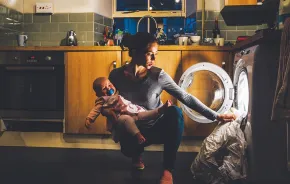Actress and producer Julia Louis-Dreyfus won her sixth-consecutive Emmy for best actress last month for her role on "Veep," the most by any performer for a single role. The day after her historic Emmy win, Louis-Dreyfus found out she has breast cancer.
Just when you thought... pic.twitter.com/SbtYChwiEj
— Julia Louis-Dreyfus (@OfficialJLD) September 28, 2017
After she announced her diagnosis on Twitter, well wishes poured in from all corners of the internet — including former Veep Joe Biden.
We Veeps stick together. Jill and I, and all of the Bidens, are with you, Julia. pic.twitter.com/JP0c2wtrJ6
— Joe Biden (@JoeBiden) September 28, 2017
Her oldest son, Henry Hall, also penned a touching note of thanks for the support his mother received.
I couldn't be more thankful for the outpouring of support for my mom yesterday. Here's a picture of us taken last year. Love to you all. pic.twitter.com/Kd2QrE4Qb4
— Henry Hall (@henryhallmusic) September 29, 2017
As Louis-Dreyfus mentioned, support from friends and family is essential for people facing serious illnesses. The American Cancer Society (ACS) website says, “Many studies have found that cancer survivors with strong emotional support tend to better adjust to the changes cancer brings to their lives, have a more positive outlook, and often report a better quality of life. Research has shown that people with cancer need support from friends.”
Upon hearing a friend has breast cancer, people want to be helpful but may not be sure what to do. Joni Avery, spokesperson for Susan G. Komen, says, “It can be hard to know what to say to a friend that has just been diagnosed with breast cancer. Comments such as ‘You are lucky you caught it early’ or ‘Be brave’ although well meaning, may not the best way to offer comfort. No matter what stage breast cancer is found at, it can be scary and your friend may not be feeling lucky or brave upon hearing her initial diagnosis.”
But there are many ways types of support friends can offer a friend with cancer. Avery suggests the following:
- Informational support. Find out all you can about breast cancer. Learn common terms and treatment options. Avery cautions, “Do not give a friend medical advice but do help make a list of questions she can ask her doctor.” Be a sounding board for her as she runs through her choices.
- Practical support. Offer to cook or clean; drive to the doctor’s office; do laundry; send a note; provide childcare; pick up prescriptions; walk the dog and so much more. Websites such as Care Calendar or Lotsa Helping Hands can help organize support and eliminate inundating a friend with well meaning calls and emails asking, “What can I do?” Even if you live out of town, you can still send things like restaurant gift certificates or home-baked goods, a copy of your favorite book or DVD set. Or send a funny card or heartfelt letter — anything that lets your friend know you are thinking about her.
- Emotional support. A diagnosis of breast cancer can bring about a wide range of emotions including shock, fear, denial, sadness and anger. Sometimes just being there and listening is what really matters. One of the nicest ways to support a friend is by trying to maintain some “normalcy” in your relationship. Having cancer can feel very lonely and isolating. Instead of just talking about her illness, your friend may prefer going to the movies or dishing about the latest episode of "Dancing with the Stars." Take your cues from her. Avery says, “Listening, spending time together, letting your loved one express her feelings can go a long way.”
October is National Breast Cancer Awareness month. For more information on how to help a friend with breast cancer, here are more resources that might help:











